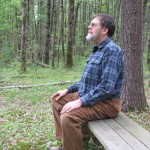So here I am, back reading more of Marcus Borg‘s
Reading the Bible Again for the First Time: Taking the Bible Seriously but not Literally. I’m making a slow job of it–in part because Peter has had the book for a while. Partly, though, I just find Borg… thin. I may have to stop every two or three pages when I’m reading a meaty Quaker writer like Lloyd Lee Wilson, just to reboot my head after I hit my personal limit for Scriptural references, but I can feel the weight of both thought and Spirit pulsing through the pages. Borg is easier to read, on the one hand… but less absorbing on the other.
I take it that he’s the the theologian that fundamentalist Christians love to hate. His two big insights–that the Bible is most useful for it’s metaphorical truths (what I, a Pagan, would call myths, in a positive sense) and for its metaphorized (mythologized) history of a people’s relationship with Spirit–seem pretty straightforward to me. And the readings he’s presenting so far (I’m only up to Exodus) don’t seem to be pushing me to read much deeper into the stories than I am able to do from my memories of the children’s Bible from my secular humanist childhood.
I had a flash of deeper meaning calling to me as I read his description of the story of Joseph, and his greeting of the brothers who sold him into slavery in Egypt. Joseph, for those who did not have the benefit of my illustrated children’s edition of the Bible, was the one who dreamed true dreams, and helped Pharaoh prepare his people for a famine. I found it interesting that, when his hungry brothers showed up in Egypt, Joseph, that mystic dreamer, was able not just to forgive, but to embrace the experience and the mitzvah that experience allowed. Borg quotes Joseph as saying:
Do not be distressed [they might well have been afraid!], or angry with yourselves because you sold me here; for God sent me before you to preserve life… God sent me before you to preserve for you a remnant on earth, and to keep alive for you many survivors. So it was not you who sent me here but God.
This combination of a spirit of forgiveness and a direct experience of spiritual leading seems to me to be a very Quaker thing. And, while I’m most familiar with Friends’ quoting from the New Testament and the letters of the early Christian church, it’s kind of neat, stumbling across such a Quakerly way of re-reading this story.
On the whole, though, I’m not finding Borg’s Bible terribly nourishing stuff. It’s not that I disagree with his way of looking at the Bible… it’s that it just doesn’t seem to be enough. I compare it with Quaker readings of the Bible that I’ve been privy to, and I miss the quick flash of lived Spirit I’ve found among some Friends who quote the Bible. I may have to work to let the language in, but I do find those Friends often have something to say that makes it worth my while to try.
For instance, reading in Each of Us Inevitable, an anthology of keynote addresses given on GLBTQ concerns, I came across Jan Hoffman’s essay, “Eros and the Life of the Spirit.” Jan’s retelling of the story of Moses and the burning bush, spoke to me–spoke to me clearly, in the heart of my Pagan experience. She writes about that moment that Spirit reaches out and grabs you by the scruff of the neck and suddenly–SHAZAM!–you are changed:
Moses was just wandering along. He saw a burning bush and turned aside, and when the Lord saw that Moses turned aside to see, God called to him out of the bush, “Moses!” It is indeed through our senses that the Divine gets our attention.
Once our attention is captured, dialogue becomes possible. Moses did not just stop at the bush, listen quietly to God’s command, and simply go away and follow that command; he talked back and negotiated with that Voice:
“You want me to talk to the People? Who shall I say sent me?”
“Tell them‘I am who I am’ sent you—that Presence which breathes life into
everything.”“Are you kidding? They’ll never believe that name!”
“Well, if they won’t believe words, maybe they will believe signs.Take up that rod and throw it on the ground.”
“It turned into a snake! Pretty impressive, but the People will think I’m just crazy, throwing rods around that turn into snakes. Can’t you send somebody else? I’ve got my dignity, after all.”
“Moses! Somebody else didn’t step aside to look at this burning bush; you were drawn to the bush; you go tell them about it…”
…This encounter was at the very center of Moses’ life; it informed his life and changed its direction. We often hear people say after similar encounters, “I’ll never be the same again.” No, thank God, we won’t. To be touched by the Divine is a gift, and it often attracts our attention in unexpected ways. Moses didn’t expect God to appear in a burning bush,and when he turned aside to see a bush and found himself in God’s presence, he at first resisted yielding to that Presence. Yet when he did yield, he found his life’s deepest integrity—that is indeed a gift.
Yes. Yes. Isn’t this what a spiritual life is for? Suddenly, the Universe is speaking to us. We didn’t expect it (though we may have longed for it). But having seen and heard the Voice of Spirit, whether in the near and familiar life of trees and animals and faces we love, or in a strange and sudden revelation, suddenly, there we are–in relationship, in dialog.
If we’re lucky, or perhaps if we’re wise, or maybe just if the Universe is persistent enough, we let that Voice in. And something about being in dialog makes us whole, or at least starts the process toward the kind of integrity that makes us whole.
So, OK. I suspect that some of my Pagan friends are cringing about now, thinking of other stories of Moses we know and find acutely distressing. (The story of Moses and the Midianite women comes screamingly to mind.) Yes, yes. The Moses of the Bible could be a right prick from time to time. (Rather like Zeus, if I put my feminist hat on,by the way.) And if we think of him as a historical human or an idealized moral model–well, sorry. He sucks. Patriarchy sucks–past, present, or future–and the myths of Moses are from a very patriarchal strata of world history.
But Pagans reclaim patriarchal myths every day. The Bible, though… the Bible is different.
What keeps those of us who are alienated from patriarchal religion from reclaiming those myths, too? Well, chiefly I think it is the fact that, unlike the stories of Zeus and other patriarchal Pagan deities, we are expected to take them literally, as absolute and historical reflections of the will of one supreme and rather vengeful god. Take it or leave it—this material, we’re told, is to be swallowed down whole.
Pagans don’t do that when it comes to Pagan mythology–we play with it, rethink it, re-envision it in art and music and theater. And, most of all, we experience it in the light of direct encounters with Spirit. In Quakerese, it might be said that modern Pagans read our myths “in the Life.” And I think that’s my point. Pagans read our mythology in something the same way that Quakers—at least some Quakers—read the Bible, not as a dead document with unchanging meaning, but as a kaleidoscope of meaning. Turn it, let the Light of Spirit shine into it, and you may see something new. Spirit–God or gods–may show you something new.
I’m not clear on the extent to which Quaker Christians see this kind of playfulness as legitimate. I’m not sure Quakers themselves are clear. At times, the creativity and openness I’ve seen demonstrated in Quaker readings of the Bible are breathtaking to me–though, from where I sit, it’s done with an openness to Spirit that is more moving to me than any other aspect of the process.
Still, I’m sure the question gets asked–among Pagans and Quakers: can this playfulness toward sacred story—and, for a moment, to the chagrin of all, let me drop the distinction between the written god-stories of the Bible and the oral traditions of the Pagan world—can it be abused?
Well, sure. You know anything humans do that can’t be, when we’ve a mind to it? I’ve read some marvelously creative and, I think, spiritually illuminating retellings of Pagan mythology over the years. Evangeline Walton’s faithful retelling of the stories of the Mabinogion are a personal favorite. I’m also incredibly fond of Neil Gaiman’s American Gods, chilling though it is in parts. But I’ve seen some ghastly-awful retellings of mythology, too. One achingly politically correct tale of a repentant former-rapist Zeus comes to mind at the moment, and I have to say: however little I admire the wielder of the thunderbolt, literary castration is no solution for the ethical challenge his myths pose for his worshippers today.
The answer, though, is not in slavish literalism, for Pagans any more than for Christians. How about we accept the possibility that our sacred texts reflect the people who told the stories, and are not perfect containers for the experiences of Spirit by those who handed them down to us? Our gods, just as much as the reality behind the creation stories and origin myths of the Bible, are badly served by fundamentalist literalism. But moving from literalism to mythological thinking will not be enough, for Pagans or for any other spiritual tradition, if we do not allow our interpretations to be guided by direct experience of Spirit. We owe it to our gods to be open to discovering for ourselves the meaning within the metaphors.
And as for Christianity—well, who am I to judge? I suspect that many Christians, reading my words here, are understandably reluctant to entrust me with any sort of reading of the Bible. I regard the Bible with no more reverence, inherently, than I do the words of Homer: I don’t “believe” in either, in the sense that the Evangelicals who ring my doorbell mean the word. Which, for the majority of Christians, would seem to settle the question of my fitness to even think about the Bible. I have no “standing” (to borrow a legal term) to argue for or against literalism or playfulness in approaching its stories.
Well, the Bible is in no danger from me as yet. It remains, when placed in my hands, a lifeless thing, without voice. But I am intrigued by how, placed in the hands of Quakers moved by Spirit, that book of old and often troubling stories can speak to me. It seems to me, outsider though I am, that Quakers have a knack for reading the Bible in the Spirit, and that allows a Light that I can’t help but feel is too large for any creed to capture to illuminate it’s pages, at least for them—or for me, if I am very daring, very open, and very wise.
At the very least, it seems to offer more meat than the thin reading I am finding so far in the liberal Christianity of Marcus Borg.















